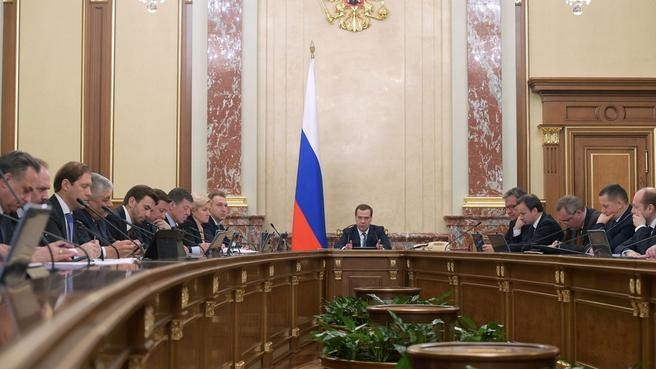Government meeting.
From Dmitry Medvedev’s opening remarks:
This is what I want to tell those who did not attend the meeting with the President on the Government’s anti-crisis plan yesterday. We discussed the main provisions of that document and have coordinated it in principle, but we also agreed that work on some of the plan’s elements should continue.
We will work in three basic areas. First, stimulate economic growth and support bedrock companies and small and medium-sized businesses. Second, provide support to specific industries and, in case of need, individual enterprises. Third, ensure social stability. This involves monitoring the prices of socially significant products and medicines, additional measures on the employment market and support for the most vulnerable groups, which are people with disabilities, senior citizens and multi-child families.
The bulk of allocations will come from the federal budget and the National Wealth Fund and in the form of government guarantees.
The first block concerns macroeconomic issues. It’s important to maintain conditions for economic development and macroeconomic stability, to ensure sustainable operation of the financial system and to support both the banking sector and responsible borrowers who took out loans for real-economy projects. We have allocated 1 trillion roubles to the Deposit Insurance Agency. Another 250 billion roubles will be allocated from the National Wealth Fund for state-owned banks to finance infrastructure projects. This money must be used to support domestic producers and to create new companies.
Government loan guarantees must be increased for real-economy companies. These guarantees should be issued primarily to the companies that are participating in the implementation of national priority investment projects.
The Government will provide insurance and loan support to Russian companies that are operating in foreign markets, including through existing export support agencies.
It is also essential to bear in mind a possible negative scenario and set aside [financial] resources to provide assistance to the core companies that will have to cut jobs. Single-industry towns should be placed under special supervision.
Support for small and medium-sized business. We will need to finalise the criteria for putting a particular company into a particular category and the support measures.
A separate section of the anti-crisis plan relates to support for
specific sectors. We should adopt sectoral import-substitution programmes. Such
decisions should also be prepared for agribusiness, the defence industry and
other sectors.
The main problem for industry today is the worsening loan conditions. So a part of industrial companies’ spending on loans to replenish their working capital will have to be subsidised. There are also plans to provide additional funding to cushion seasonal risks in agribusiness and maintain agribusiness borrowing levels.
One traditional anti-crisis instrument is stimulation of demand for particular types of industrial goods. This involves extending a number of programmes to support the domestic manufacturer. It is important to support the sectors that will help boost the development of associated manufacturing capacities, in particular housing construction, which has a significant cumulative effect, including support for affordable housing construction programmes.
Another socially important sector is transport – air and railway transport, including suburban commuter services.
Whatever difficulties the economy may be experiencing, the fulfilment of social commitments is a top priority for the Government and the state as a whole. The Government’s priority measures should involve direct support for the labour market. It is especially important to continue pension indexation programmes, and appropriate decisions have already been taken in that regard. We will closely watch the medications market to ensure stable prices and the availability of vital medications. The budget should also set aside funds for employment benefits in case of growing unemployment.
Measures should be envisioned on the regional level, including professional training and community service programmes.
Serious legislative work is needed to implement these measures, including the drafting of 60 bills, a number of presidential executive orders, and a significant number of government directives and departmental documents.
I will personally oversee the implementation of the anti-crisis plan. Commissions in the respective sectors of the economy will continue working, and there is a special commission headed by the First Deputy Prime Minister.
We all understand the causes of our economic problems. These are structural economic problems, the
lingering consequences of the 2008 crisis, the massive drop in oil prices and
of course the external pressure resulting from the political decisions that our
country took. It was a conscious choice made at the request of people who had
asked our country for help and support, and this, in fact, is the position not
only of the various branches of government but of our entire people. So as
responsible leaders, we should understand the price that we have to pay for the
decisions we took and also understand that a lot of difficult work to minimise
the effects of economic problems still lies ahead.













